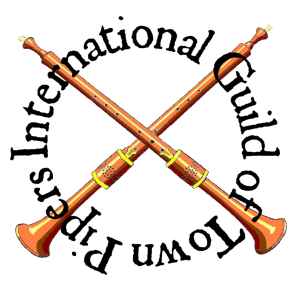The Ripon Waits in the Seventeenth Century
Pamela Radford
Ripon is fortunate to have surviving city records from 16071700, with many references to the Ripon waits. Unusually, these records have an index. The Ripon Waits also travelled widely in the seventeenth century before the outbreak of the Civil War. In those troubled times, musicians were sometimes employed as spies because it wasnot unusual for them to travel at a time when most strangers were suspect.
The first mention of waits in the Ripon records comes in 1609 when the mayor, aldermen and assistants appointed six assessors, Miles Partwell, Thomas Blackbourne, Christopher Watson, William Atkinson, Joseph Burton and Giles Horne, to raise a levy from the town of £6 8s for livery, crests and cognizances for the waits. Unfortunately they were not up to the job. In April 1610 it was reported that they, contrary to the true meaning of the said warrant and contrary to an order heretofor made by Mr Mayor, the aldermen and assistants assembled, did not with equity and indifference assess the said sum upon the inhabitants of this town and did not assess themselves being men of good ability to pay any part of the said sum in contempt of the said warrant. Two of the assessors, Joseph Burton and Thomas Blackbourne, submitted themselves for censure and were fined 10s, but were given 5s back because they had come forward. It is not clear whether 5s is what they should have assessed themselves in the first place. The mayor and aldermen ordered that William Atkinson, Christopher Watson and Giles Horne should have goods distrained. There was no mention of Giles Partwell.
Obviously the subject of waits was so traumatic that, in 1611, it was agreed that Robert Snawe and Henry Snawe his son shall be town waits for the year following and conditionally they be content to take such pay as the townsmen will bestow on them voluntarily. Even this was not enough: In 1618 three men (names unreadable) were licensed to be waits and were made freemen of the town (most towns insisted their waits should be freemen) provided they gave sureties that they, their wives and children would not be a charge on the town.
While all this was going on at home, their popularity was increasing further afield. Between 1610 and 1618 they were employed at Londesborough in the East Riding by the Cliffords, a famously musical family. Between 1618 and 1627 and again between 1636 and 1640, generally between February and May, they played for the town of Carlisle on nine occasions, receiving 1s or 2s 6d on each occasion. Between 1612 and 1621 they visited the household of Howard of Naworth (Cumberland) twice, although not in the same years as they went to Carlisle. Between 1628 and 1637 they visited Dunkenhalgh in Lancashire, the house of George Walmsley, three times in February to March, recieving 12d, and between 1631 and 1637 they ventured as far South as Nottingham and Coventry (three times each). It does not seem likely they would have travelled so far without a definite booking and so must have had a good reputation outside Ripon. They presumably performed at other places on the way and possibly played at private events in each town but there are no records of these.
After the Civil War the citizens of Ripon seemed to value their waits more. In 1654-5 they were given silver cognizances and crests, and in 1666, 1667, 1668 and 1670 therecords list money for liveries. At this date there is no record of colour, although in 1725 they wore red with gold lace.
References:
Ripon City Minutes 1607 1666, microfilm, Ripon Library, Ripon
Ripon City Minutes 1666 1700, microfilm, Ripon Library, Ripon
Ripon Millennary, 1892
Records of Early English Drama, Coventry, Ed. R. Ingram, (Toronto, 1981)
Records of Early English Drama, Cumberland, Westmorland, Gloucestershire, Eds. A. Douglas, P. Greenfield, (Toronto, 1986)
Records of Early English Drama, Lancashire, ED. David George, (Toronto 1991)
Records of Early English Drama, West Yorkshire, Eds. B. Palmer and J. Wasson, (Toronto, in preparation).
© Pamela Radford
The author is a member of the Leeds Waites
